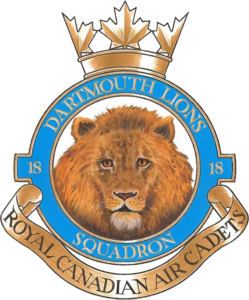Information for 18 Dartmouth Lions cadets applying for the Power Pilot or Glider Pilot Training Course – this page is typically updated annually once application information is confirmed.
Flying is a big part of the Royal Canadian Air Cadet program. Starting with opportunities to fly in an airplane or glider and learn about airport operations during their first few years as a cadet, once an air cadet reaches the eligibility requirements, they can apply for either the Glider Pilot Training Course or the Power Pilot Training Course where they can earn their Transport Canada Glider or Private Pilot’s License free of charge.
Selection for the flying training courses is intense, starting first by a cadet expressing their interest in the opportunity by registering for the National Online Ground School program and successfully completing the exam. A typically timeline is provided below (broad dates are subject to change):
- Mid-September: Registration for National Online Ground School opens
- Mid-October: Registration for National Online Ground School closes; online ground school program begins; book appointment for Transport Canada CAT-3 medical
- Late-December, early-January: National Online Ground School Exam. Cadets must pass the exam to move forward in the process.
- January: Prepare for selection interview
- February/March: File review (including school marks from previous school year) and selection interview
- April/May: Course selections announced
- Course dates: Generally seven weeks starting around the week of July 1. Will vary each training year, consult staff for specific dates typically available sometime after February.
For complete and current details about the pilot training course selection, timeline, and more please review the National Cadets & Junior Canadian Rangers Support Group Order 8060-7 – Air Cadet National Training Selection Process and all it’s annexes.
The rest of this post will detail the application process and provide some resources to help you prepare for potential selection on the Glider and Power Pilot Training courses this year.
Eligibility criteria
In order to register for the National Online Ground School program, cadets must meet the eligibility for requirements for at least the Glider Pilot Scholarship course. The below table outlines the confirmed eligibility requirements.
| Glider Pilot Training | Power Pilot Training | |
|---|---|---|
| Minimum age | 16 years of age by September 1 of the year you will attend course (e.g. if attending in summer 2022 you must be 16 by September 1, 2022) | 17 years of age by September 1 of the year you will attend the course (e.g. if attending in summer 2023 you must be 17 by September 1, 2023) |
| Proficiency level (Air Cadet training level) | Qualified Level 3 by June 30 of the current training year (e.g. if applying for summer 2024, you must be qualified Level 3 by June 30, 2024) | Qualified Level 4 by June 30 of the current training year (e.g. if applying for summer 2025, you must be qualified Level 4 by June 30, 2025) |
| Minimum school grade | Grade 9 or equivalent (Secondary 3/Senior) by end of the current school year (e.g. if applying for summer 2024, you must be Grade 9 or equivalent by June 30, 2024) | Grade 10 or equivalent (Secondary 4/Senior 2) by ned of current school year (e.g. if applying for summer 2024, you must be Grad 10 or equivalent by June 30, 2024) |
| Medical (see weekly announcements for mor details) | Valid TC Cat 3 MC, with/without restrictions | Valid TC Cat 3 MC, with/without restrictions |
| Physical limitations (cadets who don’t meet weight and minimum height requirements have until the first Monday in June to provide proof, via doctor’s note, they will) | Minimum height 152.4 cm (5 ft) Maximum height 190.5 cm (6 ft 3 in) Minimum weight 40.82 kg (90 lbs) Maximum weight 90.72 kg (200 lbs) | Maximum weight 111.13 kg (244 lbs) |
| Previous pilot permit | Must not hold any TC pilot licence or permit (please contact if in possession of a TC permit to discuss) (note: drone license acceptable) (drone license acceptable) | Must not hold any TC pilot licence or permit other than a glider pilot licence (please contact if in possession of a TC permit to discuss) (note: drone license acceptable) |
| Return to units (RTUs) | Must not have been RTU from PPTC/GPTC for lack of aptitude, motivation and/or application, misconduct, repeated air sickness, poor academic performance, failure on the TC written examination, failure to fly solo or failure to pass the final flight test. | Must not have been RTU from PPTC/GPTC for lack of aptitude, motivation and/or application, misconduct, repeated air sickness, poor academic performance, failure on the TC written examination, failure to fly solo or failure to pass the final flight test. |
National Air Cadet Online Ground School
Online Ground School registration deadline: TBD
Exame deadline: TBD
The National Air Cadet Online Ground School launched as part of the Air Cadet program’s return to flying training following lifting of most COVID-19 pandemic restrictions in fall of 2021. The purpose of the ground school is to improved standardized access to pre-training and pre-testing for air cadets planning on applying for either the Glider or Power Pilot Training Course.
Transport Canada medical requirements
As part of selection criteria for either the Glider or Power Pilot Training Courses, cadets must be able to obtain and maintain a Category 3 (CAT-3) Transportation Canada medical.
To obtain a CAT-3 medical you must book an appointment with a Transport Canada Civil Aviation Medical Examiner (CAME). You can find a CAME near you by using the Transport Canada CAME Search Tool on Canada.ca.
Additional notes:
- Transport Canada aviation medical exams must be completed by a Transport Canada CAME, you can not use your family doctor.
- There is a cost associated with the CAT 3 medical. It is expected the cadet will pay for this cost themselves. If further discussion is required, please feel free to discuss with us during a regular parade night.
- The CAT 3 medical is good for three years from date of issue. This means, if you obtain a CAT-3 medical, but are unsuccessful with selection this year, you need only provide proof of the medical next year if you choose to re-apply.
Cadets should be prepared to provide proof that they have booked a Transport Canada medical appointment by early December of the training year in which you are applying for a pilot training course.
You should book your Transport Canada Category 3 medical exam by December (at the latest – cadets with pre-existing medical conditions may take longer and require follow-up(s)) of the training year in which you are applying for a Pilot Training Course. A valid CAT-3 medical will be required in order to attend course and proof of medical is typically required by June 1 of the year in which you plan to attend the course. The process can take as long as 18 weeks.
File review
Immediately following the online ground school exam, the squadron will conduct a file review of all cadets who passed the exam. This review is based on your cadet and community service, as well as your marks in school and will be used to determine our squadron’s applicant priority. Please note: due to national policies, our squadron can only submit a specific number of applications for the pilot training courses. This number is based on the total number of cadets in our squadron. Additional details about the administrative process and policies that apply to these courses can be found in Annex B to the National Cadet & Junior Canadian Rangers Group Order 8060-7.
Points we will consider in our file review include:
- Your current rank
- Your current appointment (the “job” you fill at the Squadron, like being a Level Instructor, etc.)
- Any awards or medals you have received at the squadron, during directed activities, or at summer training
- Participation in Area, Regional, and National Directed Activities
- Other activities (e.g. optional activities like marksmanship)
- Community service
- Attendance at mandatory squadron events (must be over 60%; cadets with 80% or higher participation will receive recommendation from CO)
- School transcript from previous school year (with particular emphasis on Math and Science marks as outlined in Annex E to group order 8060-7). Please note: you should be prepared to provide your transcript at this point.
- Proof that you have booked your Transport Canada CAT-3 medical (e.g. email confirmation of an appointment, indicating name of examiner is sufficient).
Following your file review, and confirming your intent to proceed with application for consideration, the Squadron Administration team will submit your application.
Pro tip: You can request your Cadet Information Card from the Administration Office to review and ensure we have all your information up to date. You can also provide proof of things like community service, etc., to the Administration Team after you have reviewed your information card to help ensure your file is fully up to date before file review.
Selection Interview
This will likely be conducted virtually and will involve members of the Air Cadet League of Canada, Regional Cadet Support Unit (Atlantic), and other stakeholders.
The interview process is the final step in the application process so preparation is key. Once dates are confirmed, we will host practice interviews for those cadets selected for the opportunity to help them prepare. In the meantime, review the following to start your preparation:
- Read up on current events, and know who your local, provincial, and federal elected officials are, your Mayor, the Provincial Premier and Federal Prime Minister, Lieutenant Governor, Governor General, etc.
- Study your aviation knowledge – you will be asked questions similar to those on the exam, but not multiple choice, so be prepared to speak.
- Make sure your know who your Squadron Sponsoring Committee Chairperson is; your Squadron and Provincial Air Cadet League of Canada representative; the Office in Command of the Nova Scotia area; our Zone Training Officer, the Regional Cadet Support Unit (Atlantic)’s Commanding Officer, the Commander and Chief Warrant Officer of the Cadets and Junior Canadian Rangers (our national headquarters); as well as the Chief and Vice Chief of Defence staff
- You’ll also want to know how the Air Cadet League of Canada supports the Royal Canadian Air Cadet Program, their role in the Air Cadet flying program, and how the program is delivered in partnership with the Canadian Armed Forces. Start by reviewing the Memorandum of Understanding, we’ll prep additional resources which will be shared on the Weekly Announcements Board when ready.
Well that’s it for now, this post isn’t likely to be updated, but will be maintained here for your reference and will be linked off our Weekly Announcements so you can easily find it.
Good luck to all applicants.

